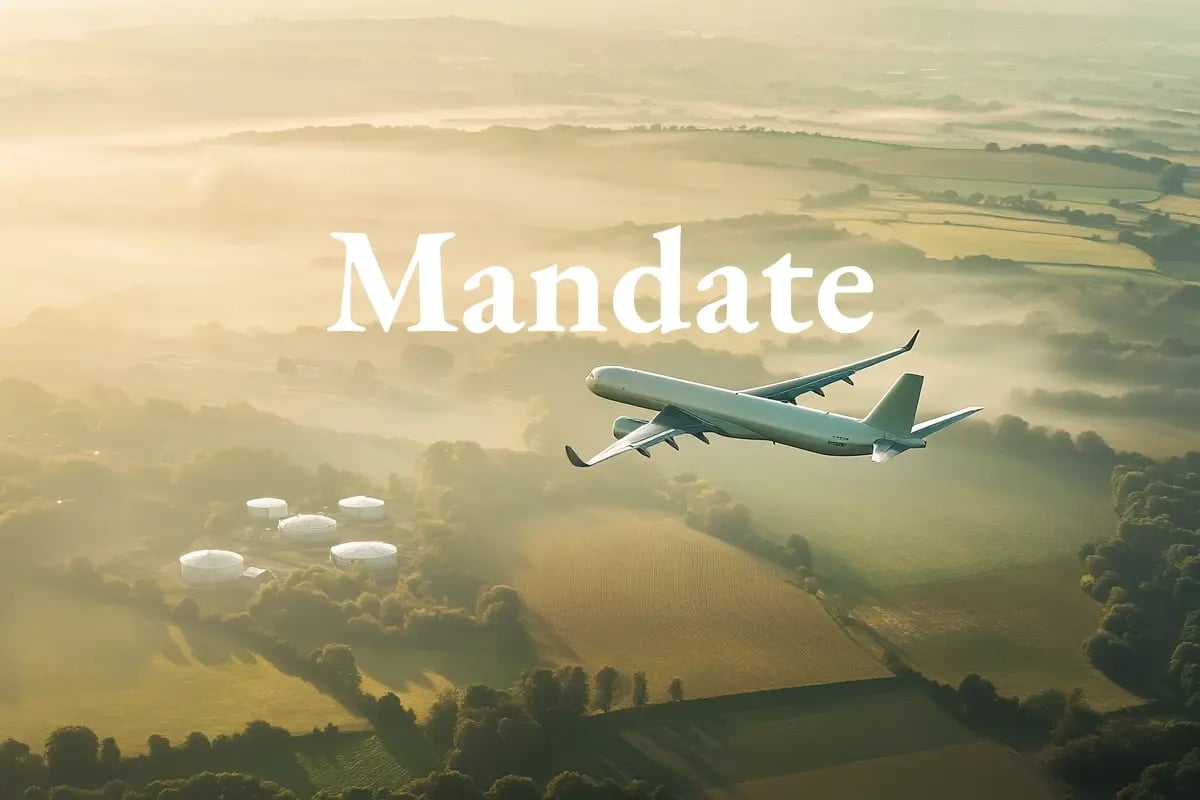The UK could soon require airlines to purchase carbon dioxide removal (CDR) credits under a binding compliance mechanism, according to a comprehensive review of the country’s greenhouse gas removal (GGR) policies. The independent review, led by former shadow Minister of Energy Security Alan Whitehead, outlines 30 recommendations aimed at accelerating removals deployment and strengthening the UK’s net-zero strategy.
 An airplane flies over the UK countryside, where direct air carbon capture and storage (DACCS) facilities blend with rolling hills. AI generated picture.
An airplane flies over the UK countryside, where direct air carbon capture and storage (DACCS) facilities blend with rolling hills. AI generated picture.
‘There is a clear case for the aviation sector to pay for the combination of removals and sustainable aviation fuels (SAF) needed for the sector to reach net zero’, the report stated. ‘This approach is in line with current policy approaches on SAF and is the fairest way to distribute the costs of the GGRs needed to balance the aviation sector’s emissions, rather than spreading the costs across all taxpayers.’
The review proposes transforming the existing SAF Mandate into a ‘Net Zero Aviation Mandate’, under which all flights departing from the UK would be net zero by 2045. The report also recommends establishing a formal mechanism to ensure airlines meet their emissions responsibilities, marking a significant policy shift for one of the hardest-to-abate sectors.
Among its five main recommendations, the Whitehead review calls for a portfolio approach to GGR technologies such as direct air carbon capture and storage (DACCS) and bioenergy with carbon capture and storage (BECCS). It highlights the need to dismantle regulatory barriers—particularly those affecting biochar—and to improve support for anaerobic digestion and biomass projects.
Read more: Balancing portfolios: Nature-based vs renewable carbon credits
The report urges the creation of an Office for Greenhouse Gas Removals to streamline policy development and improve coordination between government departments and regulators. ‘Improved coordination between government departments and regulators, and the development of clear, inclusive policies and standards are needed to unlock the full potential of GGRs and support the UK's net-zero ambitions’, it said.
The review also emphasises the need for realistic expectations around BECCS, given challenges with imported biomass such as wood pellets, and encourages greater reliance on domestic waste-based feedstocks.
Sebastian Manhart, a consultant active in the removals sector, noted that the review arrives as the UK prepares to spend nearly £21 billion on carbon capture, utilisation, and storage (CCUS) over the next 25 years. ‘We could see billions flow through its carbon contracts for difference. And smaller innovation pots were and will likely continue to be awarded to various GGR projects’, he said.
However, he cautioned that the UK must ensure policy and standards remain technology-neutral. ‘Hopefully Department for Energy Security and Net Zero will soon commission the BSI to develop the next set of standards, starting with biochar and enhanced rock weathering’, he added.
While it remains uncertain how many of the 30 proposals will advance into legislation, the review adds momentum to calls for a clearer and more coordinated national removals strategy—one that could shape the UK’s approach to aviation emissions and GGR development for years to come.
Read more: Switzerland’s green path could require quadrupling carbon credit purchases
As the UK considers mandating airlines to purchase carbon removal credits, the global shift toward verified, measurable environmental initiatives is gaining momentum. From aviation to industry, sectors are being called to account for every tonne of emissions—and to support the projects that actively remove carbon from the atmosphere. At Green Earth, we help businesses meet this rising standard through high-quality, nature-based carbon projects that restore ecosystems and deliver lasting impact. By choosing verified credits, companies can align with the next wave of net-zero policy and lead the way toward a cleaner, more resilient future.


